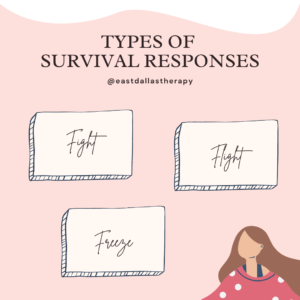Why didn’t I fight back?
You may have heard about the body’s danger responses: fight and flight. But there’s another secret weapon the body uses to defend itself: the freeze response.
The freeze response can make you feel paralyzed and numb. Instead of fighting or running away from a threat, you’re simply stuck, unmoving. You may panic on the inside and feel trapped in your head, or you may blank out, go limp, or feel like you’re floating away from yourself. In any case, the freeze response can also leave you riddled with self-blame, asking yourself, “Why didn’t I move? Why did I just let that happen to me?”

But the freeze response isn’t a conscious choice. It’s a totally automatic response to danger, just like fight or flight. When your body detects an immediate threat, it makes a split-second judgment on how to respond to best protect you.
For example, think about if you accidentally rest your hand on a hot stovetop. You don’t get a chance to stop and think about all your options while your hand burns. No, your body immediately jumps into action before you can blink! You may shout or pull your hand away before you realize what’s happening. The part of your brain that deals with planning and decision making doesn’t get a chance to figure out what to do in the situation – and that’s exactly what keeps your hand from getting burned even worse. Automatic responses are crucial to survival.

The freeze response is the same way. It’s your body’s way of managing a threat it has judged as inescapable. Freezing can come in handy when you’re faced with a wild animal (holding still so maybe it ignores you) or an opponent much larger than you are (where fighting might just get you more hurt). In a hopeless situation, it can even protect you from feeling physical pain. Kids are especially likely to experience a freeze response when faced with a threat because they don’t have as much strength or as many options open to them as adults do.
But even as an adult faced with a situation where you can clearly get away or win a fight, your body might freeze instead. Again, it’s an automatic response your body chooses for you, not a conscious decision on your part. If your body is used to freezing to survive danger, it’s more likely to resort to that same familiar response.
Others may have different automatic responses than you do to similar situations. It can be hard to resist the urge to compare, but one response isn’t better than any other. Fight, flight, and freeze are all necessary physical responses to threat.
If you want to learn more about what to do when you freeze, you can contact summer@eastdallastherapy.com or go to eastdallastherapy.com to set up an appointment.










